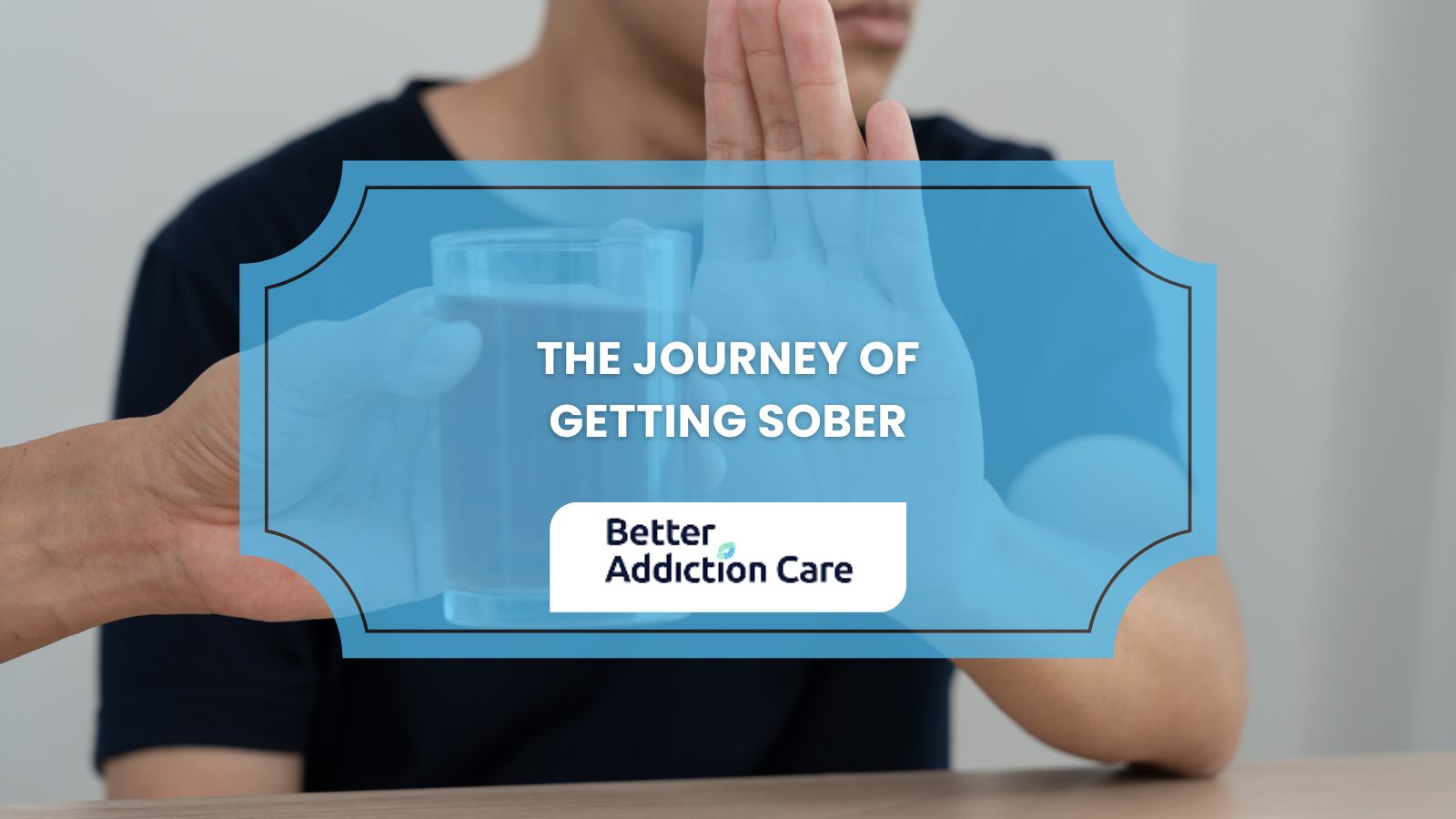Answering the Question of What is Antabuse (Disulfiram)?
Antabuse transforms your journey to sobriety into a powerful deterrent by blocking the enzyme aldehyde dehydrogenase and forcing toxic acetaldehyde to build up whenever alcohol enters your body. The effect is an immediate, intensely unpleasant reaction that keeps drinking out of the picture.
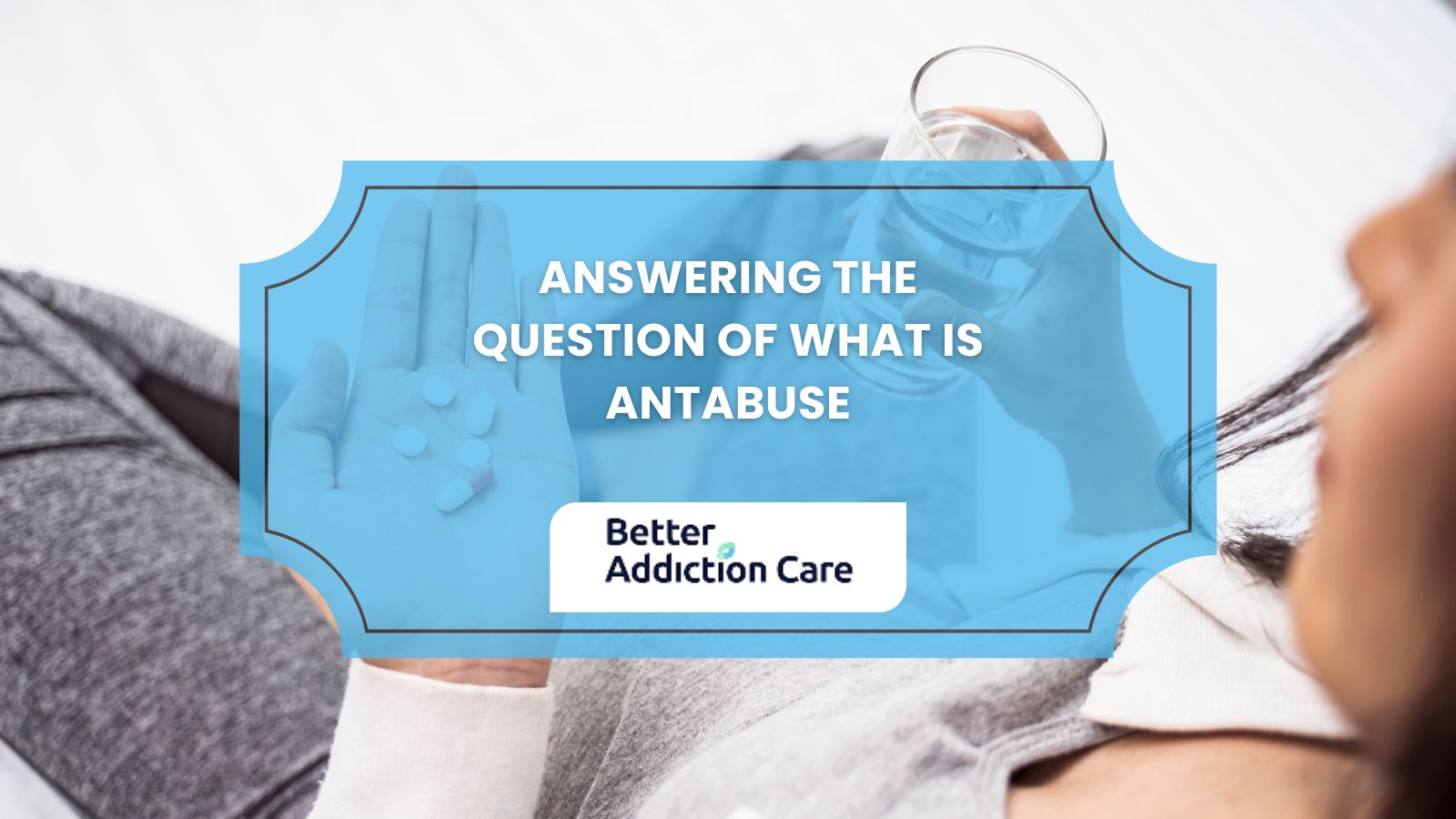
According to Schallenberg, M.'s 2025 study, 'Effectiveness of Disulfiram as Adjunct to Addiction-Focused Treatment for Persons With Severe Alcohol Use Disorder, ' disulfiram treatment demonstrated a 50% success rate for maintaining abstinence for at least one year.
This potent deterrent demands close medical supervision because side effects strike the gastrointestinal tract, cardiovascular system, nervous system, liver, skin, and mental health.
What is Antabuse?
Antabuse, or disulfiram, is a medication that treats alcohol use disorder by causing unpleasant reactions when alcohol is consumed. It blocks an enzyme, leading to a buildup of a toxic substance that causes symptoms like nausea, flushing, and dizziness. This reaction discourages drinking. Antabuse supports sobriety and is used with therapy for people committed to quitting alcohol.
What Is The Mechanism of Action of Antabuse (Disulfiram)?
The mechanism of action of Antabuse (disulfiram) is based on irreversible inhibition of the enzyme aldehyde dehydrogenase (ALDH), which is critical in alcohol metabolism. By binding to and inactivating ALDH, disulfiram prevents the oxidation of acetaldehyde, a toxic metabolite produced during alcohol breakdown, leading to its accumulation in the body.
This accumulation triggers a range of unpleasant physical reactions (e.g., flushing, nausea, and tachycardia) when alcohol is consumed, creating an aversive conditioning effect that deters further alcohol use. The drug's action is further linked to competitive inhibition at the nicotinamide adenine dinucleotide (NAD) binding site of ALDH1A1.
What Are the Uses of Antabuse (Disulfiram)?
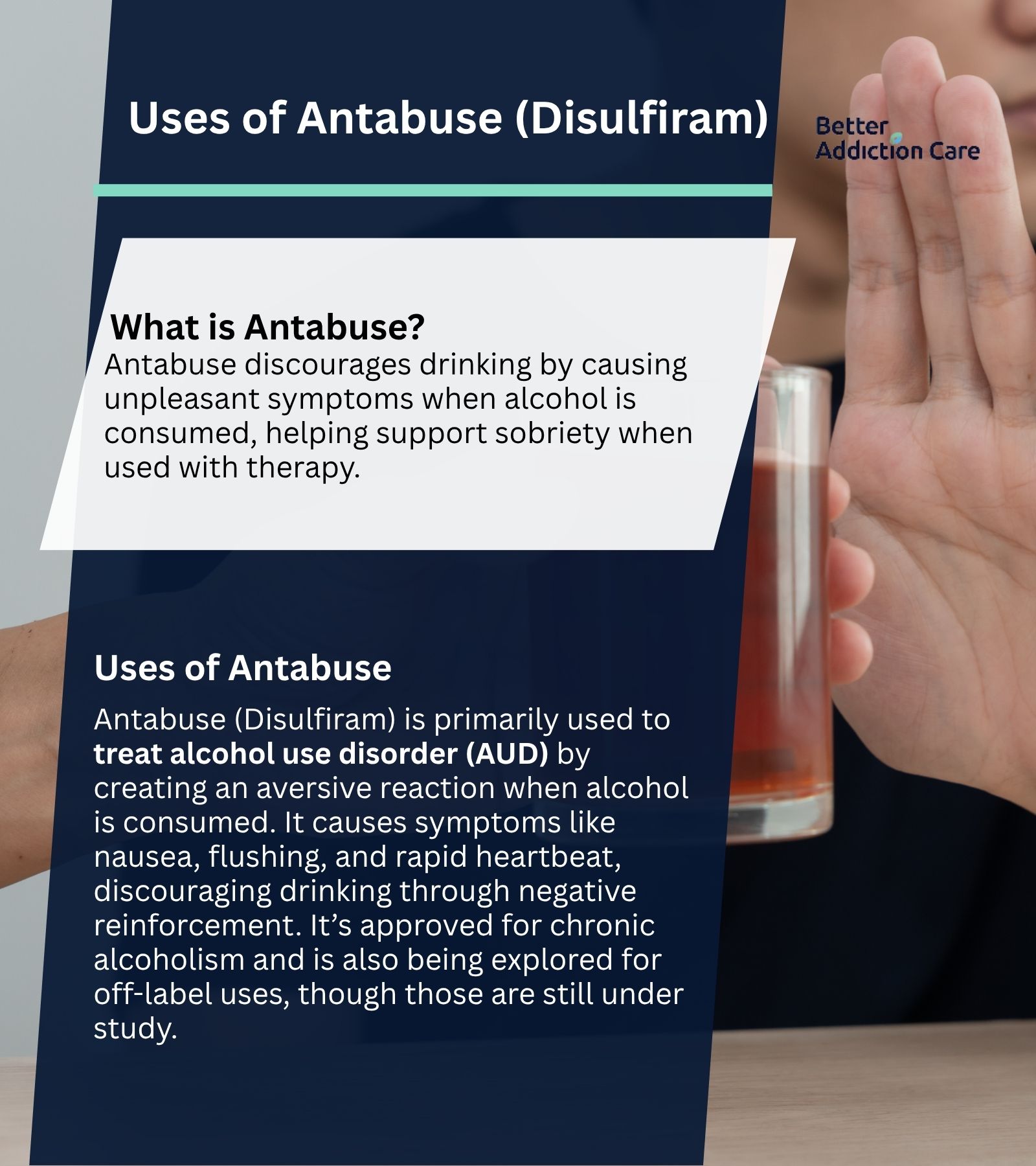
The uses of Antabuse (Disulfiram) include treating alcohol use disorder (AUD) by acting as an aversive agent that deters alcohol consumption. It is specifically approved for managing chronic alcoholism due to its ability to induce unpleasant physical reactions (e.g., flushing, nausea, and tachycardia) when alcohol is ingested, creating a negative association with drinking.
Additionally, it is being evaluated for off-label applications, such as managing other conditions, though specific details are not fully outlined in the available sources.
How Does Antabuse Affect Alcohol Abuse?
Antabuse (disulfiram) deters alcohol abuse by blocking aldehyde dehydrogenase (ALDH), causing acetaldehyde buildup during alcohol metabolism. This leads to unpleasant reactions like flushing, nausea, and headaches, creating a conditioned aversion to alcohol if you drink alcohol while taking Antabuse. It is used in alcohol use disorder (AUD) treatment to reinforce abstinence through physiological discomfort.
When to Take Antabuse for Treating Alcohol Use Disorder (AUD)?
You should take Antabuse for treating AUD only when it fits with your treatment plan and with a prescription from a doctor who has designed a full treatment plan for alcohol use disorder (AUD). People should get a full medical check to ensure they are healthy enough to take the medicine. This assessment addresses general health and liver performance.
How Should I Take Antabuse?
Take Antabuse only after abstaining from alcohol for at least 12 hours. The usual starting dose is 500 mg once daily for one to two weeks. After this, the dose reduces to a maintenance level, typically 250 mg once daily, but your doctor will provide specific instructions. Take the medication in the morning unless it causes drowsiness, in which case, take it at night. Continue daily use until your doctor advises stopping. Avoid all alcohol and products containing alcohol while taking Antabuse to prevent unpleasant reactions.
What Happens If I Miss A Dose?
If you miss a dose of Antabuse, take it as soon as you remember. If it is almost time for your next dose, skip the missed one and continue with your regular schedule. Do not take a double dose to make up for the missed pill. Missing doses reduce the medication’s effectiveness, so try to take it consistently as prescribed. Avoid alcohol even if you miss a dose, as drinking while on Antabuse causes severe reactions.
What Are The Side Effects of Anabuse (Disulfiram)?
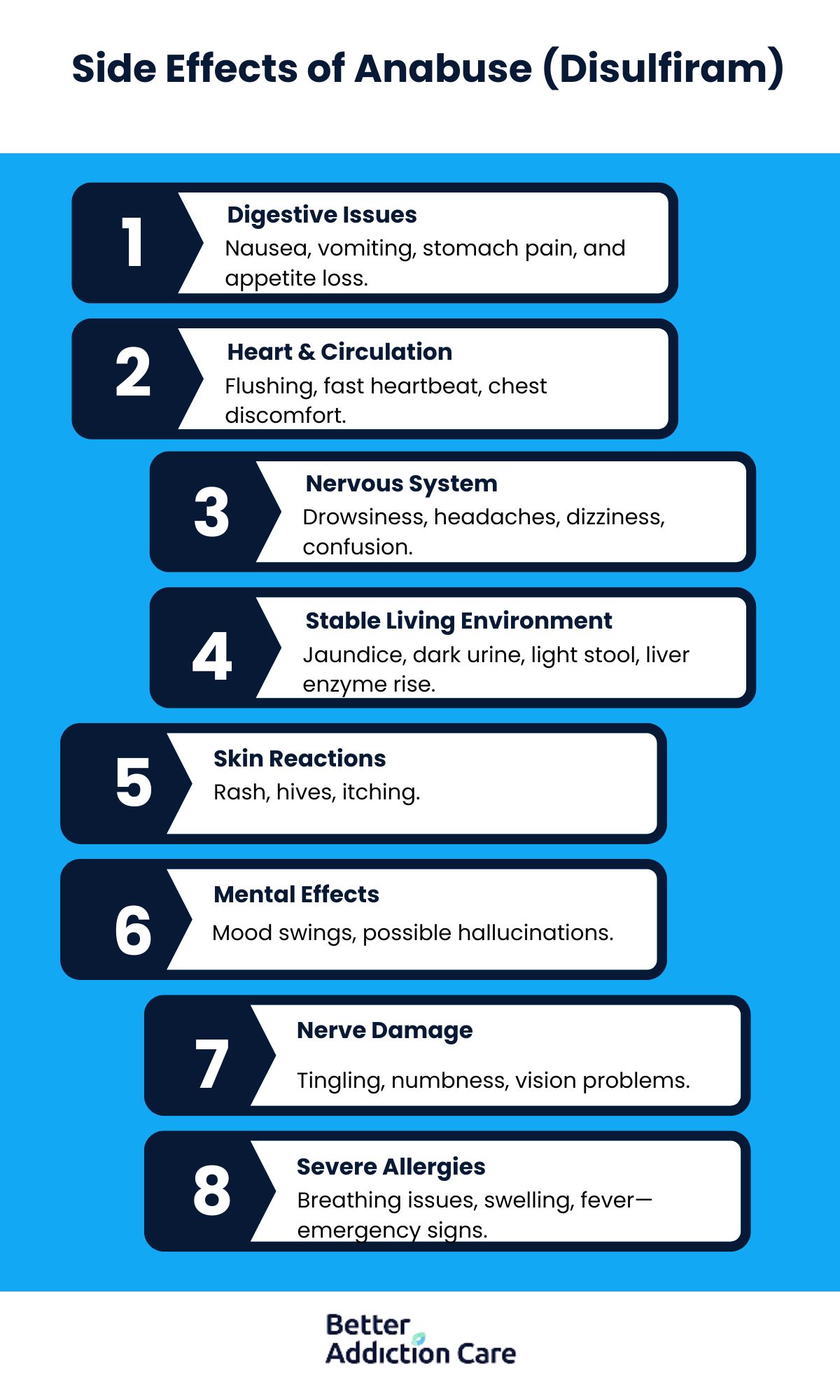
The side effects of Antabuse (disulfiram) include gastrointestinal disturbances such as nausea and vomiting, cardiovascular reactions like flushing and rapid heartbeat, neurological symptoms including drowsiness and headaches, liver-related complications such as elevated enzymes, skin reactions like rashes, and psychological effects including mood changes.
The following table outlines Antabuse (disulfiram) side effects organized by affected body systems:
-
Gastrointestinal disturbances: Nausea and vomiting occur because disulfiram affects the digestive system and triggers an unpleasant reaction when alcohol is present. Stomach or belly pain, along with loss of appetite, also develops.
-
Cardiovascular reactions: Flushing and rapid heartbeat happen as a result of disulfiram, causing a buildup of toxic substances in the blood after alcohol intake. Chest pain, shortness of breath, and a light-headed feeling also occur.
-
Neurological symptoms: Drowsiness and headaches arise due to disulfiram’s impact on the nervous system and its effect on brain chemistry. Confusion, unusual thoughts or behavior, dizziness, and a spinning sensation also occur.
-
Liver damage: Elevated liver enzymes indicate liver stress or damage caused by disulfiram processing in the body. Symptoms include dark urine, light-colored stool, itching, and jaundice, where the skin or eyes turn yellowish.
-
Skin reactions: Rashes develop as an allergic or irritant response to disulfiram or its metabolites. Hives and general itching also occur.
-
Psychological effects: Mood changes occur because disulfiram influences brain chemicals that regulate emotions and behavior. Psychotic symptoms, such as hallucinations, also develop.
-
Nerve damage: Burning, tingling, numbness, or weakness develops in the arms, hands, legs, and feet. Vision changes, including vision loss or eye pain, also occur due to optic neuritis.
-
Allergic reactions: Severe allergic responses include breathing problems, wheezing, racing heart, fever, swollen lymph nodes, and swelling of the face, lips, mouth, tongue, or throat. Trouble swallowing or throat tightness also occurs.
Who Should Not Use Antabuse (Disulfiram)?
Individuals with severe heart disease, liver or kidney impairment, psychosis, or known allergies to disulfiram or related compounds should not use Antabuse (Disulfiram). It is also unsuitable for those who have consumed alcohol within the past 12 hours or are currently taking medications like metronidazole or paraldehyde. Pregnant individuals and those with a history of severe mental illness should avoid this medication. A healthcare provider should evaluate all potential risks before prescribing Antabuse.
What Medicines Should I Avoid With Disulfiram?
Medicines you should avoid with disulfiram include alcohol and alcohol-containing products, as combining them causes severe reactions. You should also avoid antibiotics like metronidazole, blood thinners such as warfarin, anticonvulsants like phenytoin, isoniazid, and certain antidepressants. Always tell your doctor about all medications before starting disulfiram to prevent harmful interactions.
What Are The Alternatives To Antabuse (Disulfiram) For Treating Alcohol Addiction?
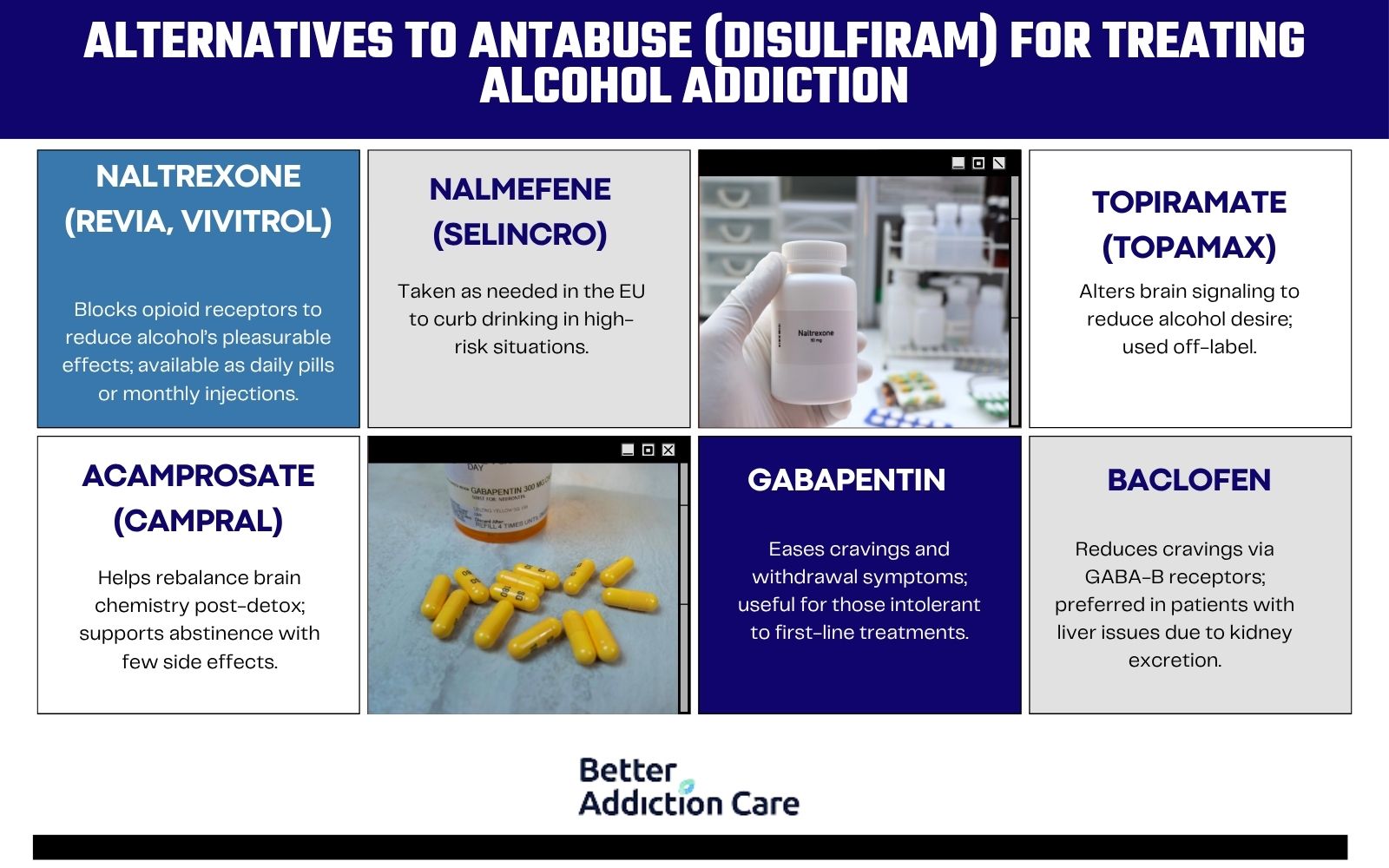
The alternatives to Antabuse (disulfiram) for treating alcohol addiction include Naltrexone (Revia, Vivitrol), Acamprosate (Campral), Nalmefene (Selincro), Gabapentin, Topiramate (Topamax), and Baclofen. Each of these medications works through different mechanisms to help reduce alcohol cravings, prevent relapse, or maintain abstinence following detoxification.
Here are the alternatives to antabuse (disulfiram) for treating alcohol addiction in detail below:
-
Naltrexone (Revia, Vivitrol): Naltrexone is an opioid receptor antagonist that reduces the rewarding effects of alcohol, thereby decreasing cravings and the risk of relapse. It is available in oral form (Revia) and as a monthly injectable (Vivitrol). Naltrexone has been shown to decrease heavy drinking days and improve abstinence rates.
-
Acamprosate (Campral): Acamprosate helps restore the balance between excitatory and inhibitory neurotransmitters disrupted by chronic alcohol use. It is particularly effective in maintaining abstinence after detoxification and is well-tolerated, with minimal side effects.
-
Nalmefene (Selincro): Nalmefene is used in the European Union to reduce alcohol consumption in individuals with alcohol dependence. It is taken on an as-needed basis when a person anticipates a high-risk drinking situation.
-
Gabapentin: Gabapentin, an anticonvulsant, has shown efficacy in reducing alcohol cravings and withdrawal symptoms. It is considered for individuals who have not responded to or cannot tolerate first-line treatments.
-
Topiramate (Topamax): Topiramate is another anticonvulsant used off-label to reduce alcohol consumption. It influences GABA and glutamate neurotransmission, which helps decrease cravings and promote abstinence.
-
Baclofen: Baclofen is a muscle relaxant that acts on GABA-B receptors, potentially reducing alcohol cravings and consumption. It is considered for individuals with liver complications, as it is primarily excreted by the kidneys.
Should You Only Get Antabuse During Inpatient Treatment or in Outpatient Treatment?
You should not only get Antabuse during inpatient treatment, as it is effective in both inpatient and outpatient settings, although each comes with different considerations. Receiving Antabuse during inpatient treatment allows for supervised administration and immediate medical response to any adverse reactions. This structured environment aids patients in their early sobriety, which is especially beneficial for those facing severe alcoholism or co-occurring conditions. Healthcare workers closely monitor patients and provide comprehensive support, including counseling and therapy.
You get Antabuse in outpatient alcohol rehab settings with proper support and regular healthcare follow-ups. Outpatients must stay highly motivated and committed to abstinence without constant supervision. Regular visits track progress, monitor side effects, and ensure treatment compliance. Strong support systems remain essential for maintaining sobriety.
Personal circumstances determine whether you should get Antabuse at home or in a hospital. Factors include alcohol consumption patterns, medical history, and available home support. Consult a medical specialist to determine the optimal Antabuse treatment setting for your safety and recovery success.
What Kind Of Support Is Provided In Local Alcohol Rehab When Taking Antabuse?
In local alcohol rehab, patients taking Antabuse receive comprehensive medical supervision and psychological support to ensure safe and effective treatment. Healthcare professionals monitor patients closely for any adverse reactions and adjust dosages as needed, while also providing education about the medication's mechanism and potential side effects. The treatment team includes doctors, nurses, and counselors who work together to create a supportive environment where patients understand how Antabuse works as a deterrent to alcohol consumption and learn coping strategies for managing cravings and triggers.
The support extends beyond medication management to include individual therapy sessions, group counseling, and family involvement programs that address the underlying causes of alcohol addiction. We help connect individuals with a local alcohol rehab facility where treatment teams provide 24/7 support, helping patients navigate the challenges of recovery while building the skills and confidence necessary for long-term sobriety.
Related Articles
Treatment Centers in New Jersey





